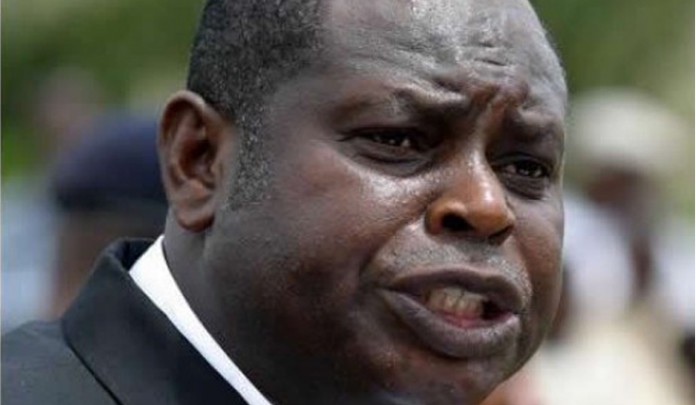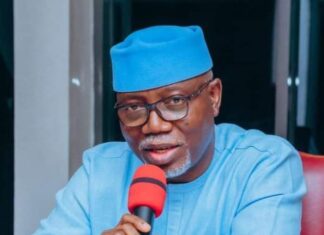The death of former Bayelsa State governor, Diepreye Alamieyeseigha, last week, opens another chapter in the politics of the state and Niger Delta region, Assistant Editor (South South), JOE EZUMA, writes.
It was with shock that many received the news of the death of former Bayelsa State governor, Diepreye Solomon Peter (DSP) Alamieyeseigha, on Saturday, October 10, 2015 at the University of Port Harcourt Teaching Hospital. While Alamieyeseigha’s associates across the land lamented his passage, the development hits his Niger Delta kinsmen like thunderbolt. In Bayelsa, the exit of the former governor left his supporters shattered, while in the entire Ijaw nation there was the feeling that a generational leader had gone.
While relations and associates rue the death of the man who styled himself as the Governor-General of Ijaw Nation, the estimation in enlightened quarters is that his exit has wider implications for Nigeria’s socio-political relations as well as the domestic politics of Bayelsa. There is even the suggestion that his passage may likely be a deciding factor in the pattern of voting and eventual victory in the coming December 5, 2015 governorship election in the state.
Alamieyeseigha, while alive, represented different things to different people. On one hand, he was vilified by critics in his local Niger Delta and chastised by the Nigerian state and collaborating foreign nations.
In another breath, he was immensely loved as dedicated governor and champion of the Ijaw cause. This, perhaps, explains why he is celebrated even in death in Niger Delta.
In apparent demonstration of the love on him, Bayelsa State Government, on learning of the death, declared seven days of mourning.
A Government House statement, to this effect, directed that flags in all public buildings and premises across the state be flown at half mast for the period.
Some Ijaw groups also took turns in reacting to the death. In their separate statements, the groups alleged that the recent extradition notice purportedly issued by Britain on the former governor aggravated his health condition and his eventual death.
The United States of America-based Ijaw Heritage and Cultural Club, in a release, remarked that it was shocked beyond words by the news of Alamasieyiegha’s death and regretted the circumstances surrounding the occurrence.
It insisted that the All Progressives Congress (APC)-led government should be held responsible for the death, blaming its alleged role in instigating the British authorities to issue an extradition notice to the late former governor as facilitating his death. The group also claimed that the alleged extradition notice, from all indications, was targeted at witch-hunting the late former governor, asking “why wait all these years until now to issue such a notice?”
Another pan-Ijaw group based in Ireland, Izon Diaspora Association, in its statement also condemned the demise of Alamieyeseigha which it said was caused by the APC government for political reasons. The group said the sad development was a calculated move by the government to silence the Ijaw movement, which it said Alamieyeseigha represented the soul and moving spirit.
“Now that he has been taken out, we Ijaw must fight against this injustice. Now is the time to unite, come together and fight against this calculated and very deadly plot by the APC government to deplete our ranks,” convener and leader of the group, Comrade George Magbisa, stated.
Initial reports on the deceased was that he died of cardiac arrest. However, in an interview later, the state’s Commissioner for Information, Esueme Kikile, revealed that the former governor “died of complications arising from high blood pressure and diabetes which affected his kidney”.
Among his critics and admirers, Alamieyeseigha was known to be fearless, highly vocal and harboured intensive local patriotism for his Ijaw ethnic group. His frenzied fight for the cause of his people and declaration of himself as the Governor-General of the Ijaw Nation soon attracted the envy of some governors in the South South region, while the administration of former President Olusegun Obasanjo marked him out as political security risk.
Consequently, a wave of intrigues was weaved around him – a development that first led to his impeachment on allegations of corruption on December 9, 2005, and scuttled his second term as a governor. Allegations continued to dog his life subsequently from home and abroad, leading to his trial and imprisonment.
Alamieyeseigha began to attract unenviable headlines when he was detained in London on charges of money laundering in September 2005. At the time of his arrest, Metropolitan Police found about £1 million cash in his London home. Later, they claimed to have found a total of £1.8 million in cash and bank accounts. He allegedly owned real estate in London worth £10 million. However, he was said to have jumped bail in December 2005 from United Kingdom, on a manner that remained controversial all through the remaining part of his life.
On July 26, 2007, Alamieyeseigha pleaded guilty before a Nigerian court to six charges and was sentenced to two years in prison on each charge. Because the sentences were set to run concurrently and the time was counted from the point of his arrest nearly two years before the sentences, his actual sentence was relatively short. Many of his assets were ordered to be forfeited to the Bayelsa government.
Alamieyeseigha, however, maintained that he only pleaded guilty to the charges against him due to his age, otherwise he would have fought the charges. The next day, July 27, just hours after being taken to prison, he was released due to time already served.
In December 2009, the federal government hired a British law firm to help dispose of four expensive properties he allegedly acquired in London. Alamieyeseigha was said to have bought one of these properties which he was using as his London residence and the registered office of Solomon Peter Inc. for £1.75 million in July 2003, paying in cash.
On March 12, 2013, the former governor was pardoned by the then President Goodluck Jonathan. While some criticised the clemency, others said it was deserving for the late politician they insisted was a victim of high voltage politics in his Peoples Democratic Party (PDP).















